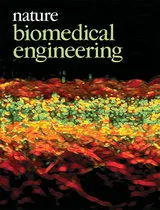Results of CBI developed RSOM are on the cover of Nature Biomedical Engineering
CBI researchers develop the first clinical handheld raster scan optoacoustic mesoscopy system (RSOM) for precision diagnosis of malignant skin conditions.
Optical microscopy imaging plays a crucial role in the diagnosis and assessment of dermatological conditions. However, currently available non-invasive optical imaging tools lack sufficient penetration depth at high resolution for subsurface analysis or longitudinal observations of diseased skin. Conversely, ultrasound based imaging systems can achieve a good penetration depth keeping high resolution, but do not provide enough contrast to observe pathophysiological features.
Therefore, we have developed a new portable clinical system that combines the high contrast of light-based imaging systems with the high penetration depth of ultrasound-based imaging systems, keeping high resolution. The technology is named Ultra Wide Band Raster Scan Optoacoustic Mesoscopy (RSOM).
With this system we imaged psoriatic plaques in vivo, obtaining unprecedented views and quantitative information of crucial inflammatory effects on the skin microvasculature. We were able to propose an objective precision severity index of the disease. The new index allows for example for objective quantification of the efficiency of novel treatments, which is reportedly an urgent need in the biomedical industry.
Our developments opened the door for imaging of other medically important skin conditions such as eczema, vasculitis or nevi that might be at the verge of becoming cancerous.
The related paper by Aguirre et al. was originally published in Nature Biomedical Engineering, May 10, 2017 and highlighted on the journal cover page (https://www.nature.com/natbiomedeng/).
